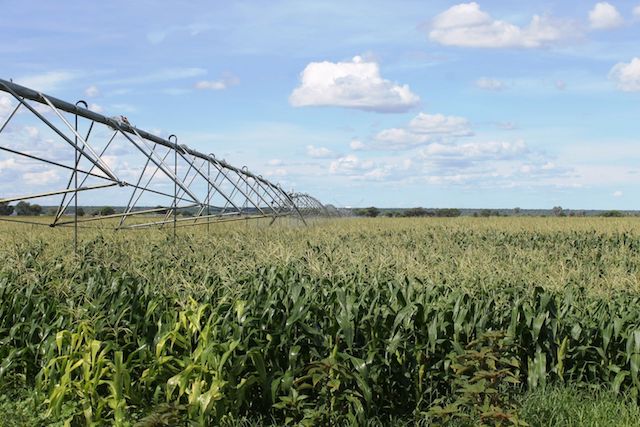ABSALOM SHIGWEDHA
This would be thanks to cooperation between the management of the farm, the local government, and the Namibia Industrial Development Agency (Nida), with the support of the Hompa Traditional Authority.
Planting kicked off in December last year.
The green scheme has been leased to a private operator for 20 years.
Winnie Metzger, a professional borehole driller, has a joint venture with the current leaseholder and hopes for a bumper harvest.
Metzger last week said this season, they have 813,5 ha of land under irrigation, of which 108 ha belongs to 9 small-scale farmers, 100 ha at the Kanyikama private green scheme, and 12,5 ha at Manyara.
“We started planting in December last year and we have also advanced the small-scale farmers’ inputs to plant their plots in time.
“At Musese a total of 531 hectares of land had commercially planted maize, while 62 hectares are for beans to augment nitrogen in the soil,” Metzger said.
He said planting was delayed due to seeds they sourced from Zambia, which took some time to be cleared.
This has forced them to source some South African seeds, resulting in planting only starting in December.
Securing fertilisers from Cape Town also took time, Metzger said.
He said in total, some N$18 million has been invested into this planting season.
Metzger said normally the small-scale farmers get loans from Agribank to buy their inputs, but the release of their loans was delayed due to bureaucracy.
“Therefore, we were forced to help them,” he said.
Metzger buys maize from the small-scale farmers, he said.
He said this season, they have not seen elephants or francolins eating their seeds, but ballworms are a challenge.
Musese has about 25 employees, some of whom are temporary workers.
WAY FORWARD
Metzger said agricultural production should be intensified at national level to ensure food security.
“The most important thing is ethics, knowledge, and hard work,” he said.
“We should learn to work hard, use our experience gained and expand in the long-term, entrepreneurship. Operators must be private people, making profits and paying taxes.”
He said the biggest challenge hampering green schemes is high electricity connection fees.
Other problems include bureaucracy in the procurement of services and materials needed, he said.
“Small-scale farmers at green schemes should be assisted after having gained experience at green schemes to develop their own irrigation farms, so they can have their own business.
“They should not be sitting on the green scheme forever, but make way for the next generation to be trained and gain experience,” he said.
The Musese irrigation green scheme is one of the oldest in Namibia, having been inaugurated in 1977.
Currently Musese, Mashare and Etunda green schemes seem to be the only ones in the north producing encouraging results.
Others, such as Sikondo, Ndonga Linena, Etunda, Shadikongoro and Shitemo have in recent years failed to inspire recognition due to poor performance.
Stay informed with The Namibian – your source for credible journalism. Get in-depth reporting and opinions for
only N$85 a month. Invest in journalism, invest in democracy –
Subscribe Now!







